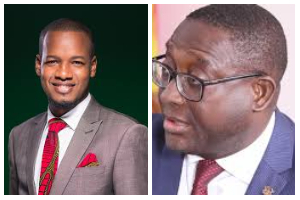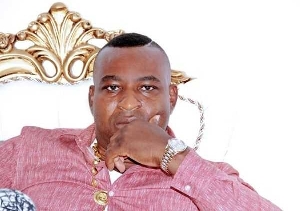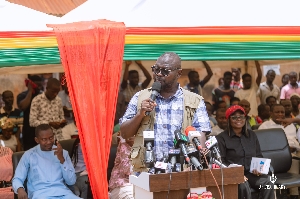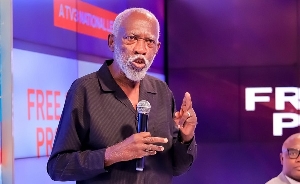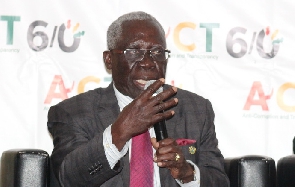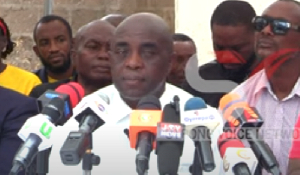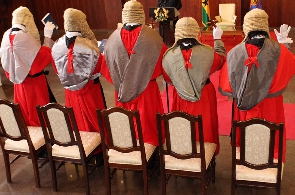 File photo of judges being sworn in
File photo of judges being sworn in
First of all, let’s not get this fundamental truth about constitutional republicanism or representative democracy twisted: That is to say, under this system, there are three coequal branches of government; and each of these branches is mandated to perform three separate but equally important functions—to make laws (parliament), to execute the laws (presidency), and to adjudicate/interpret the laws of the land (judiciary).
Because legislature, judiciary, and executive, are coequal under representative democracy as this country has in place today, it would be wrong and unfair for anyone to treat or view one of the three arms of government as sacrosanct or untouchable but subject the other two branches to criticisms. In Ghana, it seems like challenging some of the legal assumptions of the court is viewed as ‘contempt of the court.’ Let’s separate the true ‘contempt’ from contesting court’s rulings.
It has almost become a norm in this society that somehow it’s okay to subject parliament and executive branches, especially, to incessant critiques but soon as someone points out any sign of over-frenzied activism on the part of a judge, some people start screaming ‘contempt’ or ‘lawlessness.’ Even in the United States where separation of powers or coequal system of governance was first enshrined in a written constitution in 1787, that country’s judges’ legal arguments are sometimes subject to critiques by some American citizens.
It doesn’t mean the practice of carrying out drumbeat of disparagement from citizens toward judges is admirable; nonetheless, it happens in some more advanced democracies like U.S. It doesn’t equate to ‘culture of lawlessness.’ President Trump, for example, often trivializes or questions unfavourable rulings of some judges. It is not an encouraging development but judges’ work are not above reproach, either, in that if the executive and parliament are fair game for criticisms, why is it ‘lawlessness’ to question some judges’ arbitrary rulings?
In fact, many American liberals/Democrats see some judges leaning towards conservativism/Republican Party as showing ‘judicial activism’ whereas the latter groups also view liberal-leaning judges in the same lenses. In United States’ legal system, ‘judicial activists’ refer to judges who appear to interpret current laws or existing judicial decisions not necessarily based on precedent, but the same time willing to interject their own personal beliefs into their rulings. Simply put, judicial activist judges do not exercise judicial restraint—the situation where judges stay close to legal precedent and restrain themselves from incorporating their own belief system/values in their courts’ decisions.
A sober reflection of contemporary Ghanaian society in the recent past up to the present shows millions of Ghanaians overlearn or over-copy a lot of things from the colonial overlords or the Western world, although a sizable number of them do not have problem bashing the very people they copy and blame them for the source of this nation’s socioeconomic and political woes or underdevelopment. Can we have it both ways?
This is not to say copying is not normal condition of humanity, but over-copying may not or is not one of the healthy elements of human condition, to say the least. Needless to say, over-copying tends to create false narrative that somehow the things copied are conjured out of the sky. Thus, the way in which social media is used or abused in Ghana today seems as if this 21st century communication marvel is originally invented in this country. Many Ghanaians are outdoing each other in the use of social media and other things.
Surely, we all copy, directly or indirectly. For example, the political concept of checks and balances or separation of powers that is incorporated into Ghana’s 4th Republican Constitution, no doubt, is copied from the United States Constitution. On their part, the framers of American Constitution also borrowed the principles of separation of powers from the French Enlightenment philosopher Charles de Montesquieu. In many ways, this is to underscore the fact that copying (as stressed on previous occasions) is an inseparably part of human existence, including representative democracy.
Apparently, the average Ghanaian seems to have over-copied or misinterpreted understanding of press freedom as if there are no constraining mechanisms, such as prior restraint, slander, libel, sedition, obscene statutes, ‘clear and immediate danger test’ put in place to ensure reasonable counterbalance under democratic governance. In other words, in Ghana many things are adopted or copied from the Western nations, either in the wrong way or their usage tend to be overstretched to point of blurring the original meaning of the copied phenomena.
Ghana boasts of many Think Tank organizations, but looking closely at several of them, it is difficult to tell the difference between these so-called apolitical Think Tanks and political pressure groups. Clearly, many of the Think Tanks in Ghana act as pseudo pressure groups with strong partisan predispositions. Yet they do not want their ideas or positions challenged, as recently happened when vintage writer Ms. Elizabeth Ohene boldly educated Ghanaians that Think Tanks are not storehouses of all knowledge or do not have solutions to all problems bedeviling Ghana. Obviously, like other entities in our sociopolitical space, these bodies think they can dish out but not the other way around.
Indeed, Ghanaians have constitutional rights to challenge the decisions of their taxpayer-supported public officials; and, this include the executive branch led by the president; the legislative branch or parliament led by the Speaker; and of course, the judiciary arm of the government led by the Chief Justice.
In the true representative democracy, none of these branches is above each other to the extent that it should not be challenged within the ambience of civility. Like all mortal humans, judges are not saints; hence, they can show ‘judicial activism’ or some of their rulings can be flawed. Far from defending what might be indefensible, Honorable Kennedy Agyepong, the Assin Central MP, has every right to question some judicial verdicts much the same way some Ghanaians, including the media, often put the president and parliament on the chopping board.



